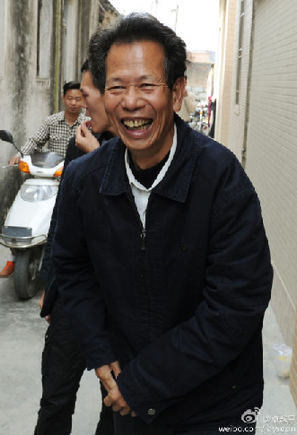Yes, Wukan: Democracy Chinese style
- By Zhu Huaxin
 0 Comment(s)
0 Comment(s) Print
Print E-mail China.org.cn, February 9, 2012
E-mail China.org.cn, February 9, 2012
On Feb. 1, thousands of villagers in Wukan, Lufeng City, Guangdong Province voted for an independent committee which will be responsible for supervising the re-election process to determine the village's leadership. An Internet user nicknamed "Churen Guofeixiong" noted that, "The villagers who participated in the election were all in high spirits. Even the elderly and the wheelchair-bound came to vote. Just by looking at them, you could get a sense of their feelings of personal pride and mastery."
|
|
|
Villager Lin Zulian was then appointed as the secretary of the village's new party committee and was responsible for leading the preparation work of the re-election of the village committee. |
After the initial phase, during which the government pronounced that "outside forces have fuelled the fire [in Wukan], events took a dramatic turn when the government stressed that it would "satisfy the reasonable demands of the masses with greatest determination, sincerity and maximum effort." Entrusted by the Guangdong Provincial Party Secretary Wang Yang, a provincial investigation group led by the Deputy Provincial Party Secretary Zhu Mingguo, traveled to Lufeng City to deal with the aftermath of the events in Wukan. Shortly after, it was announced that the previous village committee election was invalid and the former village head, who had dominated Wukan's village affairs for more than 40 years, was detained and interrogated. Subsequently, the villagers voluntarily removed all blockades and resumed normal life. All parties reached a consensus based on "The masses protect their rights according to law and the government maintains social stability according to law."
After 1978, the grass-roots organs of state power were separated from the People's Communes and the former collective economic organizations became villager-run grass-roots institutions of self-governance. It is widely felt that, after 30 years of the self-governance model, the time is ripe for improving both the electoral systems and election campaigns. A photo of Wukan villagers writing on their ballot papers inside a voting booth in a classroom at a school-turned-polling-station went viral online. One Internet user nicknamed "China Micro-observation" commented: "While we are still discussing the question of whether or not there should be private screens to ensure voters have privacy in the National People's Congress, the villagers, who are lower down society's scale and have relatively lower literacy rates, have already addressed the details of democracy." This proves that the Chinese people can afford to engage in democracy and that it may be time to bid farewell to all questions regarding the quality, or otherwise, of democracy, Chinese style.
As sociologist Sun Liping said, social contradictions have increased in recent years, and previous methods of maintaining social stability are outdated. Guangdong's handling of events in Wukan suggested a new and open-minded way of tackling social issues, which can satisfy both the public's desire to articulate their interests and concerns and the goal of maintaining social stability. In recent years, great efforts have been made in Guangdong to promote social development. In addition, a series of measures have been carried out, such as facilitating organization's registration process and fostering various social organizations. It's believed that such efforts will help China address its existing problems. Last year, disgruntled farmer Qian Mingqi detonated three bombs on government property as a result of the inadequate compensation he received after officials had, he claimed, illegally demolished his home. After the incident, a famous Internet user nicknamed "Xiaoshu" urged the public to rely on grassroots democracy and "remove the fuse by using the ballot box".
Many people are comparing Wukan with Xiaogang Village, which was the first village to divide the People's Commune-owned farmland into pieces for individual households to cultivate. What both villages have in common is that they respect the villagers' right to make their own decisions. As long as the government builds a good system, maintains respect for civil rights and public opinion, and elects good people to act in the interests of the people, it will be able to satisfy its people and achieve long-term stability.
(This article was first published in Chinese and translated by Li Huiru)
Opinion articles reflect the views of their authors, not necessarily those of China.org.cn.






